We’ve all been there… even though we’ve just enjoyed a tasty and filling meal, we still have a persistent yearning for something sugary.
A lot of it comes down to our conditioning – we expect something sweet after a meal.
But, instead of giving in and having ‘just one tiny slice’ of pie, why not try a little bit of fruit (what I like to call ‘nature’s candy’) instead?
It’ll hit the spot in terms of sweetness, but it comes without the side-helping of guilt!
Here are ten of the healthiest fruits you can enjoy to curb your sweet tooth.
Blueberries
 Blueberries have been ranked number one in terms of antioxidant activity when compared to 40 other fresh fruits and vegetables – meaning if you want to snack on something sweet, these could be your best bet for added health benefits.
Blueberries have been ranked number one in terms of antioxidant activity when compared to 40 other fresh fruits and vegetables – meaning if you want to snack on something sweet, these could be your best bet for added health benefits.
According to Tufts University researchers, eating blueberries regularly has been linked to better short-term memory.
These juicy berries may even improve insulin sensitivity, which is important for staving off type 2 diabetes.
One piece of research found that 67% of people who drank a blueberry smoothie twice daily for six weeks had at least a 10% improvement in insulin sensitivity.
It’s thought that the high antioxidant content of blueberries may also help fight certain types of cancer. Research indicates that compounds in the fruit can stop tumors and lesions from forming, particularly in relation to oral cancer, colon cancer and prostate cancer.
Blueberries are also a good sweet treat option for those watching their weight. Not only will their sweetness stop you from tearing into a packet of Oreos, but they may actually help burn belly fat.
A University of Michigan study found that obese rats fed blueberry enriched meals actually lost fat from their stomachs, whereas the placebo group did not.
One cup contains just 84 calories and provides 36% of your recommended daily intake of vitamin K, 25% of manganese and 24% of your vitamin C needs.
Find out more about the great health benefits of blueberries here.
Apples
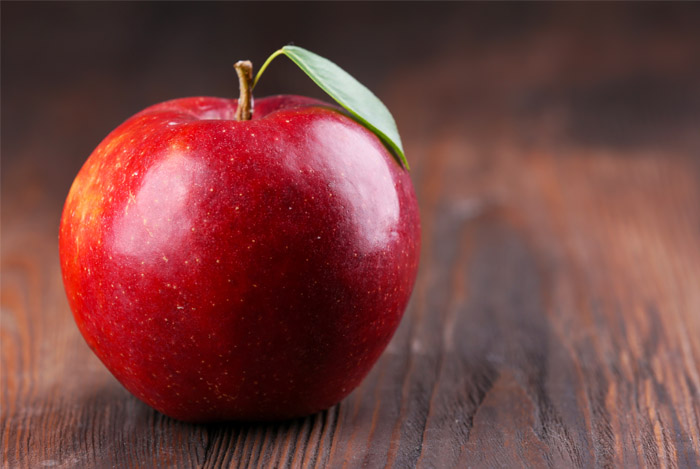 Apples are another great fruit to snack on if you’re looking to lose weight, mainly because they’re high in fiber and have a low glycemic index.
Apples are another great fruit to snack on if you’re looking to lose weight, mainly because they’re high in fiber and have a low glycemic index.
Research has proven that choosing apples over cookies as a snack will help you lose weight.
In the study, women were assigned to eat either three apples, three pears or three oat cookies a day. The women snacking on the fruit lost 1.3 kg over a period of 12 weeks.
Apples are also a good snack choice for people with respiratory problems, specifically asthma.
A study published in 2001 found that those who ate two to five apples a week had a 32% lower risk of asthma than people who ate less.
And, a later study showed the children of women who ate four apples a week during pregnancy were 37% less likely to have a history of wheezing and 53% less likely to have doctor-confirmed asthma, over those whose mothers ate one or less apples a week.
One medium apple, with skin, contains 95 calories, 17% of your fiber requirement and 14% of your vitamin C needs.
Pineapple
 Pineapple is one of my all-time favorite fruits, it’s naturally sweet and syrupy so a little goes a long way to stopping those sugar cravings.
Pineapple is one of my all-time favorite fruits, it’s naturally sweet and syrupy so a little goes a long way to stopping those sugar cravings.
One cup of pineapple chunks will add just 82 calories to your daily tally but will provide a huge 131% of your daily vitamin C needs and 76% of your manganese needs.
What makes this tropical fruit so impressive is that it’s one of the richest sources of the enzyme bromelain.
Bromelain can help aid digestion, prevent allergies and asthma, and reduce inflammation and joint pain.
In fact, a 2014 study has highlighted just what a potent painkiller bromelain really is.
Researchers were evaluating bromelain’s ability to reduce post-operative pain in patients who had just undergone a painful tooth surgery.
Those who were prescribed bromelain had ‘significantly lower’ pain, swelling and redness compared to those given a regular pain killer!
Because the core of the fruit contains the most bromelain, you’ll want to make sure the pineapple is pretty ripe so you can tuck into a softer core.
Kiwifruit
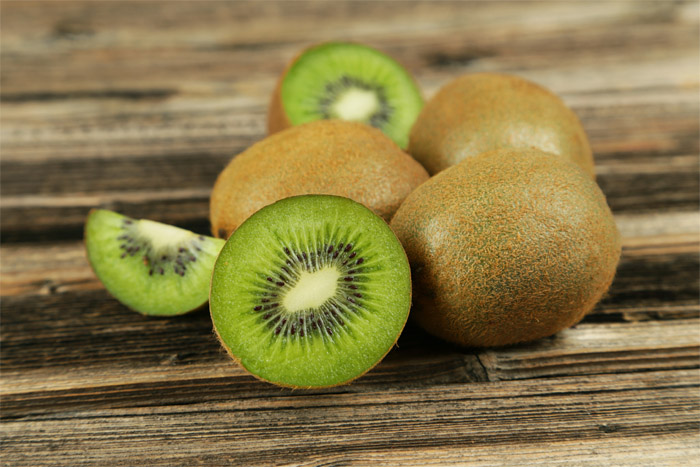 Eating a kiwifruit after a meal instead of a chocolaty dessert might be a good idea for several reasons.
Eating a kiwifruit after a meal instead of a chocolaty dessert might be a good idea for several reasons.
Naturally you’ll keep your calories, sugar and fat intake down. But you may also be benefiting your digestive system.
Kiwifruit contains actinidin, a compound that breaks down protein.
Lab experiments and animal studies show that this compound may improve protein digestion in the gut, perfect for those times when you’re feeling unpleasantly full after a high-protein meal.
If you’re suffering constipation, another type of digestive discomfort, then kiwi might help get things moving again!
A study of 33 patients with chronic constipation found that eating two kiwis daily for two weeks significantly improved constipation symptoms.
Other research has found that kiwis can be helpful for those with IBS (irritable bowel syndrome).
Eating two kiwifruit daily for a month was found to improve the frequency and function of bowel movements in IBS sufferers, but not in healthy patients.
One medium kiwifruit, without skin, will cost you a measly 46 calories, but for that you’ll be getting more than your daily requirement of vitamin C (117%), 38% vitamin K and 9% of your fiber needs.
Want extra nutrients? Eat the skin too – here’s what you’re missing out on if you don’t!
Watermelon
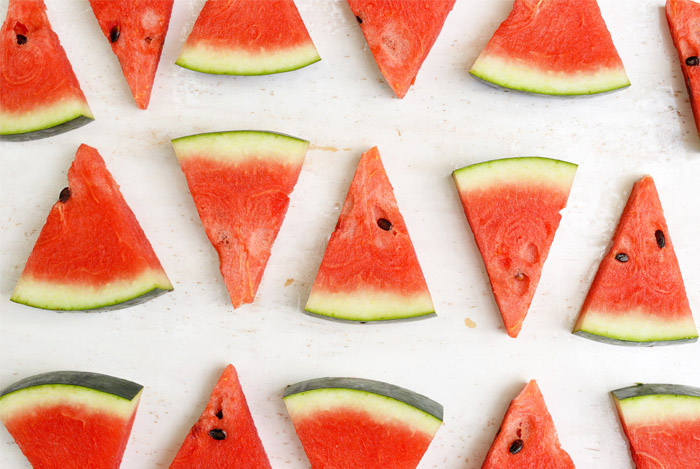 A perfect summer fruit, watermelon is sweet, refreshing and hydrating. But did you know that juicy watermelon can play a role in protecting your heart?
A perfect summer fruit, watermelon is sweet, refreshing and hydrating. But did you know that juicy watermelon can play a role in protecting your heart?
A compound in watermelon, called citrulline, is believed to be behind its cardiovascular benefits.
This amino acid helps our bodies produce nitric oxide, a gas that helps blood vessels and arteries to stay flexible, thus lowering blood pressure.
A study, looking at the effects of watermelon on heart health in mice, found that mice who drank watermelon juice had around 50% less plaque in their arteries than the mice who didn’t. They also had lower cholesterol levels and less weight gain.
Another compound in watermelon, called lycopene (which is also found in tomatoes), may further protect heart health.
A 2011 study from South Korea found that lycopene can reduce oxidative stress, blood pressure levels and inflammation, all of which contribute to an unhealthy heart.
One cup of diced watermelon contains just 46 calories, 21% of your daily vitamin C needs and 17% vitamin A, along with trace amounts of other important vitamins and minerals.
Thanks to its high water content, it also counts toward some of your daily fluid intake.
Watermelon has a ton of other health benefits too – from preventing muscle soreness to promoting glowing skin. Check them out here.
Cherries
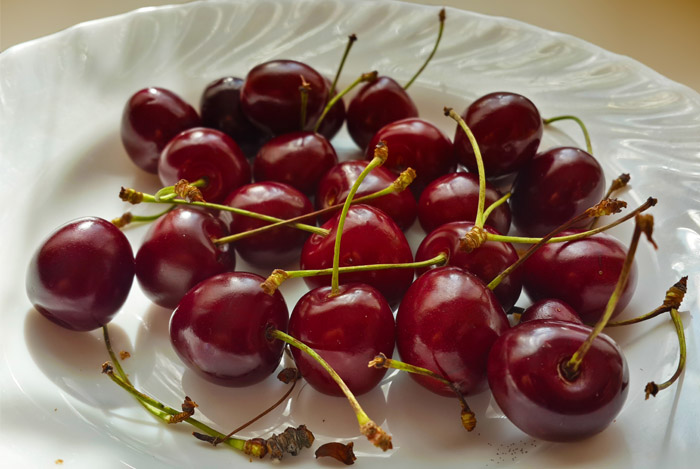 Sweet and tart cherries are a delicious low calorie snack that taste way better than junk food!
Sweet and tart cherries are a delicious low calorie snack that taste way better than junk food!
They’re also an amazing source of pain relief, particularly when it comes to inflammatory conditions like gout and osteoarthritis, and they’re also good for muscle soreness.
In a 2012 study, 633 people with gout, a condition causing joint pain, particularly in a big toe, were followed for a year.
It was found that consuming cherries led to a 35% lower risk of gout attacks in the two days following consumption, compared with no intake of cherries.
Another study, this time on women with osteoarthritis, found that drinking tart cherry juice twice daily for three weeks significantly reduced inflammation markers in the body.
The women also enjoyed a 20% reduction in their arthritis pain.
And if you suffer from muscle soreness after exercise, it might be worth your while snacking on cherries after the gym.
Runners who drank 12 ounces of tart cherry juice twice a day for the week before, and during a strenuous running event, experienced less muscle soreness than other athletes.
Thanks to their high melatonin content, cherries are also one of the best foods to help you fall asleep.
Tart cherry juice, taken 30 minutes prior to going to bed, over a two-week period has been found to reduce the severity of insomnia.
Noticing a pattern here? It seems to be tart cherries, rather than sweet ones, that have been used in the studies – something to keep in mind when choosing your fruits.
One cup of cherries with pits, provides 87 calories, 16% of your vitamin C needs and 12% of your daily fiber requirement.
Oranges
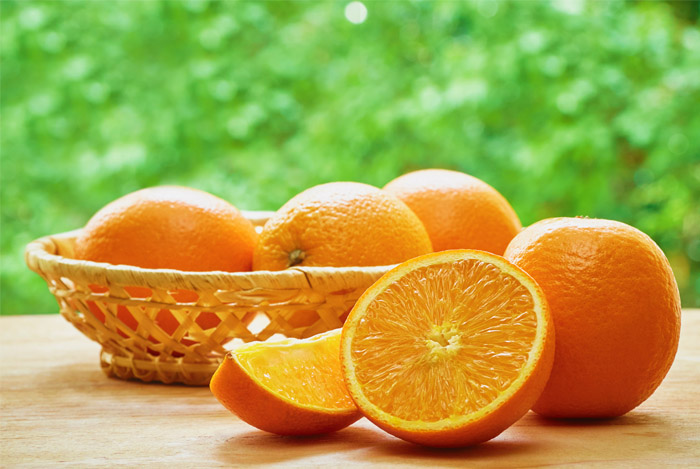 Sometimes, I think oranges are underrated in their health benefits. Sure, they’re touted for their vitamin C content, but they have a lot more going for them than just that.
Sometimes, I think oranges are underrated in their health benefits. Sure, they’re touted for their vitamin C content, but they have a lot more going for them than just that.
For starters, they can play a role in kidney health. Oranges are a good source of citric acid and citrates, which prevent the formation of kidney stones.
These natural citrates have been shown in studies to have similar effects to potassium citrate, which is often prescribed to those with stones.
You might remember I mentioned in this article that some kidney stones can grow to the size of a golf ball – ouch! If you’re at risk of kidney stones, then get eating some oranges.
The humble orange can keep your ticker healthy too due to their flavonoids, particularly hesperidin.
A 2011 study of healthy, middle-aged moderately overweight men, found that regular consumption of orange juice decreases blood pressure.
The researchers point to the hesperidin content as the likely source of the heart benefits.
Even though this study used orange juice, as opposed to the whole orange, it may be more beneficial to eat the whole fruit – as you’ll be getting some fiber, which slows the absorption of the fruit’s sugar and stops you crashing.
In fact, fruit juices made my list of the ‘Health Foods’ That Aren’t Healthy At All.
One regular orange has 62 calories, 116% of your vitamin C requirement, 13% of your fiber needs and 10% of your recommended folate intake.
Bananas
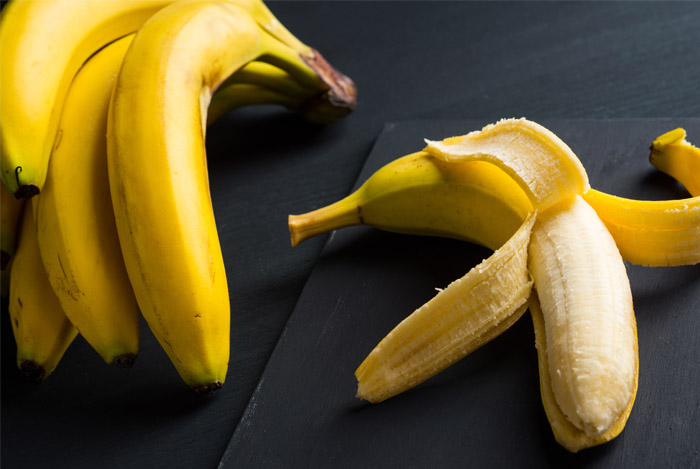 Bananas are one of the most consumed fruits in the world. I can see why, they’re delicious, filling and sweet.
Bananas are one of the most consumed fruits in the world. I can see why, they’re delicious, filling and sweet.
They also have a number of health benefits, most notably when it comes to the health of you heart.
The American Heart Association say that a diet rich in natural sources of potassium is important for controlling blood pressure.
This is because potassium can actually reduce the effects of sodium in the body, something that is notorious for causing hypertension (high blood pressure).
A large analysis that looked at numerous studies (carried out between 1966 and 2009) on the relationship of potassium, blood pressure and heart health, found that consuming around 1.3 grams of potassium daily reduces your risk of heart disease by 26%.
One large banana has almost 0.5 grams of potassium, in addition to 121 calories, 25% of your vitamin B6 requirement, 20% of vitamin C, 18% of manganese and 14% of your fiber needs.
Check out my article on bananas for more of their healthful properties – from aiding digestion to boosting your workout.
Papaya
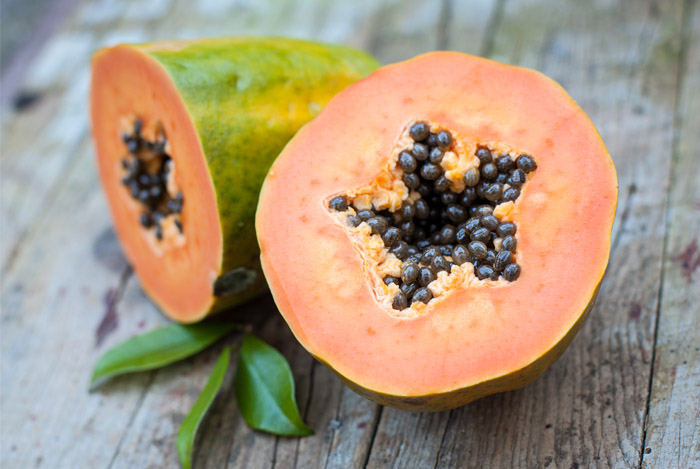 One cup of delicious papaya cubes has just 55 calories, 144% of your daily dose of vitamin C, 31% of your vitamin A needs, 13% of folate and 10% of both your potassium and fiber requirements.
One cup of delicious papaya cubes has just 55 calories, 144% of your daily dose of vitamin C, 31% of your vitamin A needs, 13% of folate and 10% of both your potassium and fiber requirements.
In fact, papaya is one of the highest fruit sources of vitamin A. This fat-soluble vitamin is important for healthy skin, teeth, tissue and vision.
So important is vitamin A for our eyesight that a deficiency can lead to night blindness.
One study, which looked at a patient deficient in vitamin A, found that it took an entire seven months of vitamin A supplementation for night vision levels to return to normal.
A lack of vitamin A has also been linked to inflammation in the intestines, lungs and skin whereas studies have found that supplementing with vitamin A helps with several inflammatory conditions.
Papayas are also a pretty rich source of vitamin C – giving more than your daily requirement of the stuff. Dr Mark Moyad of the University of Michigan claims that “high blood levels of vitamin C may be the ideal nutrition marker for overall health”.
Avocado
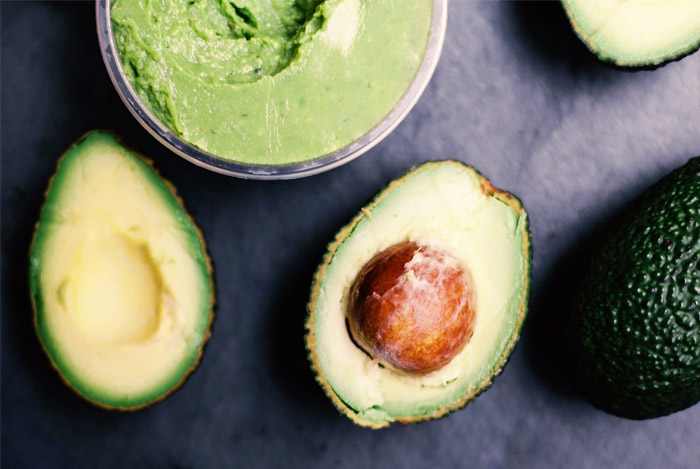 When you think of fruit, you may not instantly think of avocado. Even though it’s not sweet like the other fruits on this list, it’s definitely worth considering.
When you think of fruit, you may not instantly think of avocado. Even though it’s not sweet like the other fruits on this list, it’s definitely worth considering.
The good fats in avocado can fill you up and stabilize blood sugar levels, meaning you can say goodbye to those sugar cravings.
A study, published in the Nutrition Journal, found that eating just half an avocado with lunch helped overweight people feel satisfied and full for longer after eating.
Participants in the research reported a 40% less desire to eat over a three-hour period, and a 28% less desire over a five-hour period after the meal.
Blood tests showed no increase in blood sugar levels when compared with those who ate a standard lunch with no avocado.
What’s more, these fruits are incredibly nutrient dense, offering nearly 20 vitamins and minerals per fruit including 53% of your daily dose of vitamin K, 41% of your folate needs, 33% of vitamin C, 28% of potassium and 21% of your vitamin E needs.
Do you find that a nice, fresh piece of fruit curbs your sugar cravings?
The post Craving Something Sweet? Try One Of These Top 10 Healthiest Fruits appeared first on Nutrition Secrets.
http://www.nutritionsecrets.com/craving-something-sweet-try-the-healthiest-fruits/
No comments:
Post a Comment